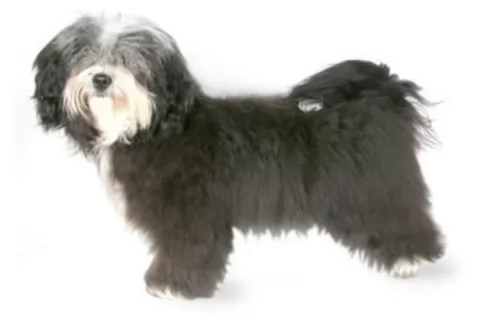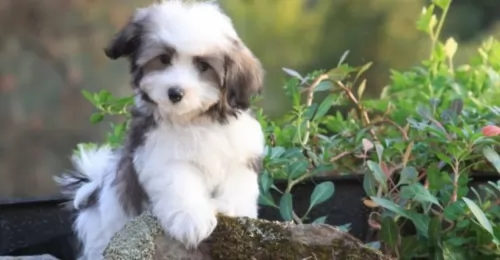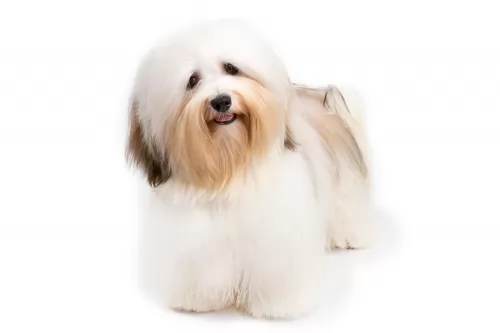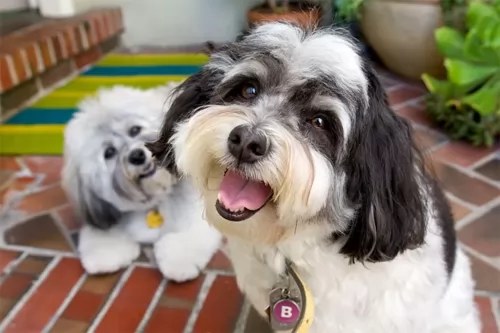 Petzlover
Petzlover Golden Doodle is originated from United States but Havanese is originated from Cuba. Golden Doodle may grow 39 cm / 16 inches higher than Havanese. Golden Doodle may weigh 14 kg / 31 pounds more than Havanese. Both Golden Doodle and Havanese has almost same life span. Both Golden Doodle and Havanese has almost same litter size. Golden Doodle requires Moderate Maintenance. But Havanese requires High Maintenance
Golden Doodle is originated from United States but Havanese is originated from Cuba. Golden Doodle may grow 39 cm / 16 inches higher than Havanese. Golden Doodle may weigh 14 kg / 31 pounds more than Havanese. Both Golden Doodle and Havanese has almost same life span. Both Golden Doodle and Havanese has almost same litter size. Golden Doodle requires Moderate Maintenance. But Havanese requires High Maintenance
 The Goldendoodle, known fondly as the Golden Poo, originates from the USA and was first bred in the 1990’s, coming about because of two popular dog breeds being mated together – the Golden Labrador and the Poodle.
The Goldendoodle, known fondly as the Golden Poo, originates from the USA and was first bred in the 1990’s, coming about because of two popular dog breeds being mated together – the Golden Labrador and the Poodle.
He isn’t recognized as a standardized breed by any of the major kennel clubs. The beautiful dog was first bred in 1969 by Monica Dickens, and of course when everybody saw the little golden ball of sheer delight, everybody wanted one and the dog’s popularity soared.
The original purpose of the cross-breed was to develop guide dogs which would go down well with people with allergies. Today, not all Goldendoodles are hypoallergenic, but they’re also popular because they have a low shedding coat.
 The only breed of dog that is native to Cuba is the Havanese. These little dogs are great companion animals. Sociable and happy, they are very popular in the United States with urbanites. These happy little pups are a Bichon type of dog which was developed from the “Little White Dog of Havana” or the Blanquito de la Habana which is now extinct.
The only breed of dog that is native to Cuba is the Havanese. These little dogs are great companion animals. Sociable and happy, they are very popular in the United States with urbanites. These happy little pups are a Bichon type of dog which was developed from the “Little White Dog of Havana” or the Blanquito de la Habana which is now extinct.
The Blanquito de la Habana was itself developed from another extinct breed the Bichon Tenerife. Then the Blanquito was bred with the other Bichons and poodles in developing the Havanese. It is believed that some of the first people to settle in Cuba were from Tenerife, an island close to Cuba. In the early part of the sixteenth century, little white dogs were brought to Cuba with these settlers. This dog of Tenerife is believed to be the ancestor of all Bichon breeds.
At that time trade with Cuba was highly restricted by the Spanish and so these dogs developed without any crossing from other breeds from outside the country. They grew to be able to stand hot temperatures and they grew a very unique coat – almost like silk. Their coat is soft and light, while insulating them from the tropical environment.
At this time Cuba was the place to be for Europeans aristocrats on vacation. Unlike the British colonies, Cuba had theatres, operas and palacious. When going back to Europe, many took this little white dog with them to France, Spain and England. The Dog of Havannah was a favorite on European soil as well. Many of these dogs taken to Europe were fawn or parti instead of white. Meanwhile back in Cuba, the bourgeoisie were replacing the aristocracy who themselves would soon be replaced by the Revolution.
During the days of the bourgeoisie, the Havanese became very popular household pets. The breed has been a family pet for the last 150 years. At the same time the breed was very trendy in Europe with Charles Dickens and Queen Victoria owning several. They were by now familiar participants in Europe’s dog shows. Finally, with the Revolution, the bourgeoisie left the country in droves with their little white dogs. A genetic pool was then formed in the US. Gene pool from 11 dogs. All the Havanese in the world are descended from those 11 dogs with the exception of the dogs isolated in Cuba and the US. Today the Havanese is one of the most popular and fastest growing breeds in the world.
 The Goldendoodle is a medium sized dog, standing between 61 -66 cm in height and weighing between 14 – 20kg. Nothing is set in stone with regards to his size as the Poodle can be Toy, Miniature and Standard, meaning the Goldendoodle can be a smallish dog or he can be a large dog.
The Goldendoodle is a medium sized dog, standing between 61 -66 cm in height and weighing between 14 – 20kg. Nothing is set in stone with regards to his size as the Poodle can be Toy, Miniature and Standard, meaning the Goldendoodle can be a smallish dog or he can be a large dog.
His coat is usually golden, cream, yellow, red and even leaning towards brown or black. It is mostly medium length and wavy or even curly. Many Goldendoodle owners send their pets in to have their coats professionally shorn.
He has medium length, floppy ears and the tail is long.
Making the most wonderful family pet and companion, Goldendoodles have just the right temperament for them to be used as therapy- or rescue dogs. They’re bright, outgoing alert, social, gentle, loving, patient with children, adults and pets and friendly and amicable as well.
They’ve inherited wonderful characteristics from both the poodle and the Golden Labrador. He is an energetic dog so even though he adapts well to city life or country life, he will need to have exercise as in walks and ball games.
 The Havanese is a sturdy little dog, a member of the toy group. They weigh no more than 16 pounds (7.3kg) and his body is longer than it is tall. The breed has a unique topline that is not level, but it is straight. His front legs are longer than his hind legs producing the lively gait everyone is used to seeing with a Havanese. With a full muzzle that tapers to the nose, the Havanese does not seem to be short. The skull’s length is the same as the muzzle’s. The head of the Havanese is round in the back and flat in the front.
The Havanese is a sturdy little dog, a member of the toy group. They weigh no more than 16 pounds (7.3kg) and his body is longer than it is tall. The breed has a unique topline that is not level, but it is straight. His front legs are longer than his hind legs producing the lively gait everyone is used to seeing with a Havanese. With a full muzzle that tapers to the nose, the Havanese does not seem to be short. The skull’s length is the same as the muzzle’s. The head of the Havanese is round in the back and flat in the front.
They have a deep chest, almond shaped eyes that are dark brown and their ears are about halfway down the nose. The long ears hang down the side od the face. They have a long plumed tail that is held high and upward. The standard for the breed and now the laws of the United Kingdom state that there can be no docking of the tail.
 Your Goldendoodle is sure to be a real joy in your home. He is a lively, healthy dog breed and when you treat him like a family member, a real deep bond can be developed.
Your Goldendoodle is sure to be a real joy in your home. He is a lively, healthy dog breed and when you treat him like a family member, a real deep bond can be developed.
He loves to be included in everything going on in the household and doesn't like being left alone for a long time. He has wonderful characteristics from the Golden Retriever and the Poodle as both these dog breeds are known for their friendly, patient, kind, amicable and intelligent personalities.
Easy to train, your Goldendoodle is obedient and wants to please, and is just waiting to become a loyal, loving friend in your family.
 Havanese are highly intelligent and eager to please, and they are easily trained so long as you use only positive methods. This can be a sensitive breed, so care must be taken to not scold them harshly. Socialization from an early age is very important. Expose them calmly to a wide variety of new places and new people, always ensuring that the experiences are positive and not intimidating. Gentle, patient training will result in a wonderful companion dog. They are affectionate with people and get along with other nonaggressive pets.
Havanese are highly intelligent and eager to please, and they are easily trained so long as you use only positive methods. This can be a sensitive breed, so care must be taken to not scold them harshly. Socialization from an early age is very important. Expose them calmly to a wide variety of new places and new people, always ensuring that the experiences are positive and not intimidating. Gentle, patient training will result in a wonderful companion dog. They are affectionate with people and get along with other nonaggressive pets.
The Havanese is the consummate lap dog. Over time they have become the lovable family companion.
The breed is pretty adaptable being able to live as a companion animal in almost any setting. Just don’t expect your Havanese to go hiking or romp with you on 40 acres in the country.
They are intelligent, love to learn but can be a little stubborn. Train them early as they like their habits and its much harder to train an older Havanese.
 The Goldendoodle is a healthy dog, but each breed involved with bringing about the Goldendoodle - Poodles and Golden Retrievers – can be prone to hip dysplasia. Both dog breeds are also susceptible to inheritable eye disorders.
The Goldendoodle is a healthy dog, but each breed involved with bringing about the Goldendoodle - Poodles and Golden Retrievers – can be prone to hip dysplasia. Both dog breeds are also susceptible to inheritable eye disorders.
There are some common dog ailments worth knowing about. The idea is to get your pet to the vet as soon as possible when you detect that he isn’t his usual self.
Allergic skin disease is common in other dog breeds as well, and once the allergen is inhaled or absorbed, your pet can battle terribly with itchy, red skin. This inflammatory, chronic skin disease can drive your pet mad and you’ll see him scratching and licking continually. Get him to the vet as soon as possible because it may just be a case of changing his diet.
This is something that can even be seen in young dogs when the hip joints don’t develop normally. It can cause arthritis, terrible pain and lameness with your pet.
You’ll notice that your pet battles to see- and get around at night. Signs of night blindness can lead to loss of vision, particularly with your middle-aged Goldendoodle.
 A very healthy breed, the Havanese doesn’t have a lot of health issues, but they are not immune to the problems of small breed dogs. The issues they do have are:
A very healthy breed, the Havanese doesn’t have a lot of health issues, but they are not immune to the problems of small breed dogs. The issues they do have are:
 Taking care of a Goldendoodle isn't only about feeding him and seeing he has a fresh bowl of water available. It’s about making him part of the family and giving him love and attention just like with any family member. He needs -
Taking care of a Goldendoodle isn't only about feeding him and seeing he has a fresh bowl of water available. It’s about making him part of the family and giving him love and attention just like with any family member. He needs -
Good nutritious food to keep him healthy.
A warm dry place to sleep at night.
A place during the day that offers shade from the sun and shelter from the rain.
He needs to be brushed to remove loose hairs, have his nails trimmed, his ears checked for infection and his teeth brushed 2 or 3 times a week.
He needs to be exercised – walks, ball and rope games, swimming and joining you in your activities.
He needs to be taken to the vet when he is showing signs of illness.
He needs love, care and attention just like any other family member.
 Feed 3 to 4 times per day a high quality dry puppy food for toy or small dogs. Feed ¼ to ½ cup each time.
Feed 3 to 4 times per day a high quality dry puppy food for toy or small dogs. Feed ¼ to ½ cup each time.
Remember these are small dogs and don’t overfeed. Feed a high quality dry food for small or toy dogs. Feed twice a day at about ½ cup each time.
The breed is generally very healthy.
This breed is not an overly active dog, but he does need some exercise. A nice walk once a day or a backyard to play in. They play inside as well as out. Don’t over exercise the Havanese. They do well in obedience and confirmation more so than agility or fly ball